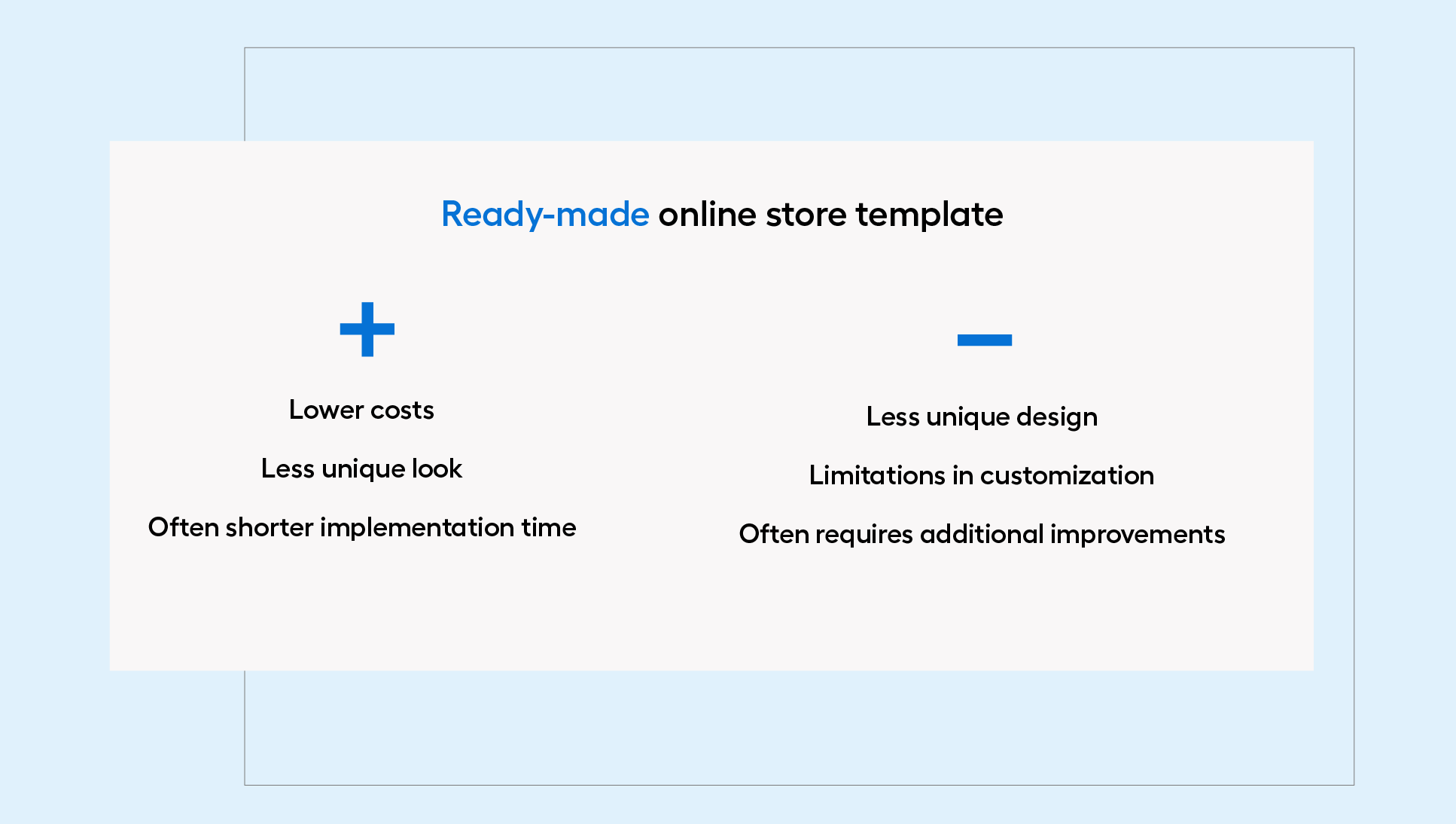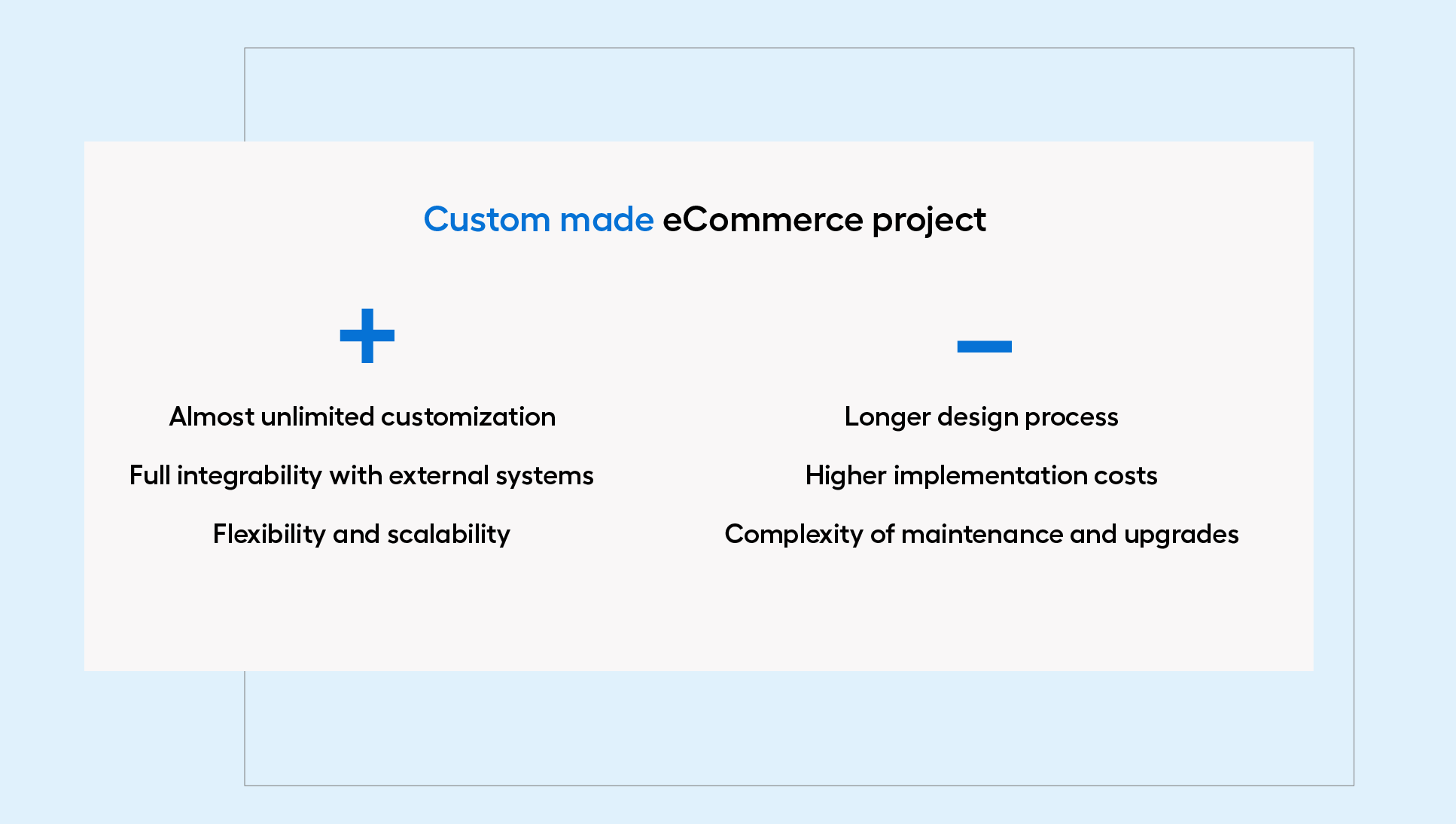Ready-made template vs custom design - which to choose to effectively sell online?
The first impression is the most important - what, we see in the first seconds, plays a key role in decision-making. This is also the case with eCommerce - the first thing customers notice when they visit your online store is the visual aspects. That's why it's important to take care of the right design of your online store. You can achieve this by either choosing a ready-made eCommerce template or betting on your own design. Learn the advantages and disadvantages of each of these solutions, and find out which one will be best for your business!
Design eCommerce - take care of (not just) the first impression
A properly tailored e-store design is not only an aesthetic appearance, but more importantly a tool for creating a unique and personalized shopping experience that attracts customers and builds their trust. In addition, design tailored to the specifics of the e-store also affects:
- Ease of navigation - a properly designed interface makes it easy to navigate the site, so customers can quickly find what they are looking for. Complicated or unintuitive controls inside the site can discourage customers from browsing the site and, consequently, from further purchases.
- Increase conversions - properly designed and compliant with User Experience (UX) guidelines, elements can significantly impact conversions. Easier to find products, quick completion of transactions and a positive shopping experience increase the likelihood of purchase. Customers are more likely to repeat purchases at stores where their first visit was pleasant and hassle-free.
- Strengthen recognition - the design of the online store should be consistent with the brand's visual identity. Consistency in terms of visuals not only support creating a recognizable brand image, but also helps to convey the values of your business.
More than budget, or what influences the choice of eCommerce design?
When comparing an off-the-shelf eCommerce template with a custom solution, the first noticeable difference is price and time. Projects made from scratch require a larger investment due to the fact that all elements of the e-store must be designed from scratch by designers, coded by developers and then tested by testers. With a template, on the other hand, you already benefit from a pre-designed solution, which may or may not require minor revisions, making the cost of implementation significantly lower. However, the choice between a ready-made template and your own online store design is not only a matter of cost. When deciding on a particular solution, there are several other important factors to consider:
- Target audience and industry - an aesthetically pleasing appearance of the online store is standard. It is a confirmation of professionalism, increases trust and customer comfort. However, this does not mean that every online store has the same aesthetic needs. The way products are presented or filtered will vary depending on the type and complexity of the offer. In some industries such as beauty or fashion, a distinctive design is particularly important, while in more technical industries a simple and clear design may be sufficient. Complex filtering or product sorting options, on the other hand, will be more important.
- Timing - if you're keen to get up and running quickly (because, for example, you want to start selling a new product in the market before the competition), the timing of the platform design will be crucial. Ready-made templates allow you to launch your store much faster (although not always immediately) than when designing your own site from scratch.
- Platform responsiveness - in an era of increasing mobile users, responsiveness of an online store is an important issue. According to a study by GoodFirms, up to 73% of mobile users give up browsing sites that do not work properly on their smartphone or tablet screens. For this reason, it is worth ensuring that the design you choose is highly responsive. It's worth bearing in mind that not all templates take responsiveness into account, and in the case of a custom design, taking care of these key issues usually extends the work time on the project.
- Additional functionality - in the case of a custom design, the possibilities for introducing additional solutions are almost unlimited, allowing you to better match the appearance of the store to the needs of the industry and stand out from the competition. On the other hand, in the case of a template, you use the idea of its creator, so you always have to reckon with the fact that not everything will be fully consistent with your vision.
It is worth noting that the choice between a ready-made template and your own eCommerce design should always take into account the unique features and goals of your business. Every case is different, so you should carefully consider which option will best meet the needs of your e-store and its customers.
Will a ready-made eCommerce template always be a proven solution?
A ready-made online store template is a pre-prepared base that gives structure to your eCommerce. Such a layout takes into account the rules for the arrangement of individual elements on the site. Depending on your individual needs, you can customise it to a limited extent (for example, by changing the content or colours).
The main advantage of this type of solution is the ease of implementation. Regardless of what budget you have and what stage of development your business is at, you can create an online store that will start selling almost immediately in less time than if you designed the platform "from scratch". In addition, more and more often, additional features and tools (such as data analysis systems or content management tools) are available as part of a ready-made template, making it easier to manage an online store without having to develop additional solutions.
However, you have to reckon with the fact that ready-made templates are created to meet the needs, the widest possible audience. The most popular templates can be used by up to hundreds of online stores. Therefore, by opting for such a solution, you are also deciding, to some extent, to give up the unique image of your e-store. The limitations of template customization can make it difficult to meet all the individual needs and requirements of your customers. In addition, some templates may negatively affect the site's performance and responsiveness, which may also prove to be a drawback.

Ready-made eCommerce template - where to look for this type of solution?
Ready-made online store templates are available from many sources - you can choose from available templates in libraries dedicated to a particular store engine, such Shopify or Magento from Adobe Commerce. Alternatively, you can search marketplaces (such as Themeforest.net), where you will find a wide selection of ready-made designs created by various designers. When choosing a template from these sources, you should pay attention to the unique features of the template (e.g. responsiveness, additional sub-page designs included, layout of elements on the page) and the possibility of personalization, so that an improvement in the form of a ready-made template actually meets your needs. After all, it can often turn out that the absence or unsatisfactory quality of certain elements in the template forces the need to create them from scratch, which not only misses the idea of the solution, but also requires spending additional time and resources.
If you care about quality and confidence that the template will be polished, it is worth considering the offer of software houses, which also offer ready-made templates. In addition, if minor adjustments are needed, such changes can be made directly by specialists. This will thus ensure the consistency and high quality of your online store.
Custom eCommerce project - when is it worth investing in uniqueness?
Custom design is nothing more than creating a platform design virtually "from scratch". Fully customised design involves higher implementation costs than a duplicated template. eCommerce owners who opt for this solution treat it as an investment. It's an important step towards strengthening and establishing a presence in the industry. It allows you to create a unique sales platform that reflects your brand, its values and aesthetics. In a nutshell, custom design gives you full control over how customers perceive your company compared to the competition.
The process of designing your own platform usually takes longer, but in return you can get many benefits such as:
- flexibility - a custom design gives you more freedom to add new features and adapt existing ones (e.g., using new technologies like VR, AR or artificial intelligence).
- scalability - custom platform grows with your business, adapting to both high traffic and growing number of products in different markets, including overseas.
- full integrability with external systems - custom eCommerce design allows you to customise the integration to meet your company's individual needs, enabling a smooth flow of data between different systems (e.g. WMS or CMS).
An in-house eCommerce project guarantees greater control over all processes, but it also involves managing technical support. This is a responsibility that requires maintenance, updating the system and resolving any technical problems. Therefore, before deciding on your own eCommerce project, you should carefully consider your goals, financial capabilities and business strategy.

Final decision: ready-made template vs. custom design
When choosing how to design your online store, it is necessary to consider many factors and thoroughly understand the needs of your own online business. To make it easier for you to choose between your own platform design and a ready-made template, we have prepared a summary of the most important aspects you should pay attention to before making your final decision - all gathered in the table below.
| Custom design | Ready-made template | |
|---|---|---|
| Uniqueness | Fully personalised, the ability to achieve a unique look and functionality. | Limited uniqueness, many stores using the same templates. |
| Time of implementation | Often longer time is required to develop a custom online store design. | Ability to start selling much faster than with a ready-made design. |
| Cost of implementation | Usually higher cost associated with developing the project from scratch, time of programmers and designers. | Fees for ready-made templates are much lower, but depending on the complexity of the implementation can increase. |
| Scalability | Ability to easily adapt the platform to the growing needs and development of eCommerce. | Scalability depends on the choice of ready-made template and its ability to grow. |
| Additional functionality | Full control over adding new features and customizing existing ones. | Depending on the available features in the ready-made template, it may require extensions or customizations. |
The choice is in your hands - how will you design your eCommerce?
Proper design of an online store is not just a matter of aesthetics, but more importantly a matter of business strategy. A well-designed website is an investment that can bring a return in the form of increased sales, customer loyalty, and building a strong online brand. Therefore, when choosing between an off-the-shelf template and your own eCommerce design, it's worth considering not only the initial costs but also the long-term goals and requirements of your business.
Have you already made a decision or do you need additional help? We would be happy to learn about your needs and advise you on the best solution for your eCommerce. Ask us about a free UX audit (if you already have an eCommerce store) or schedule a consultation!



